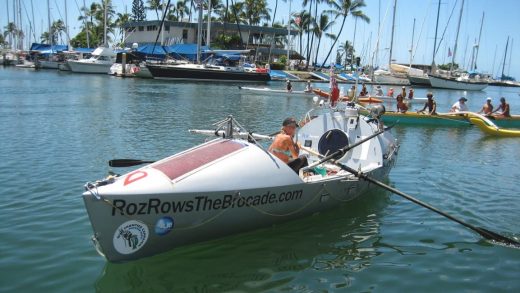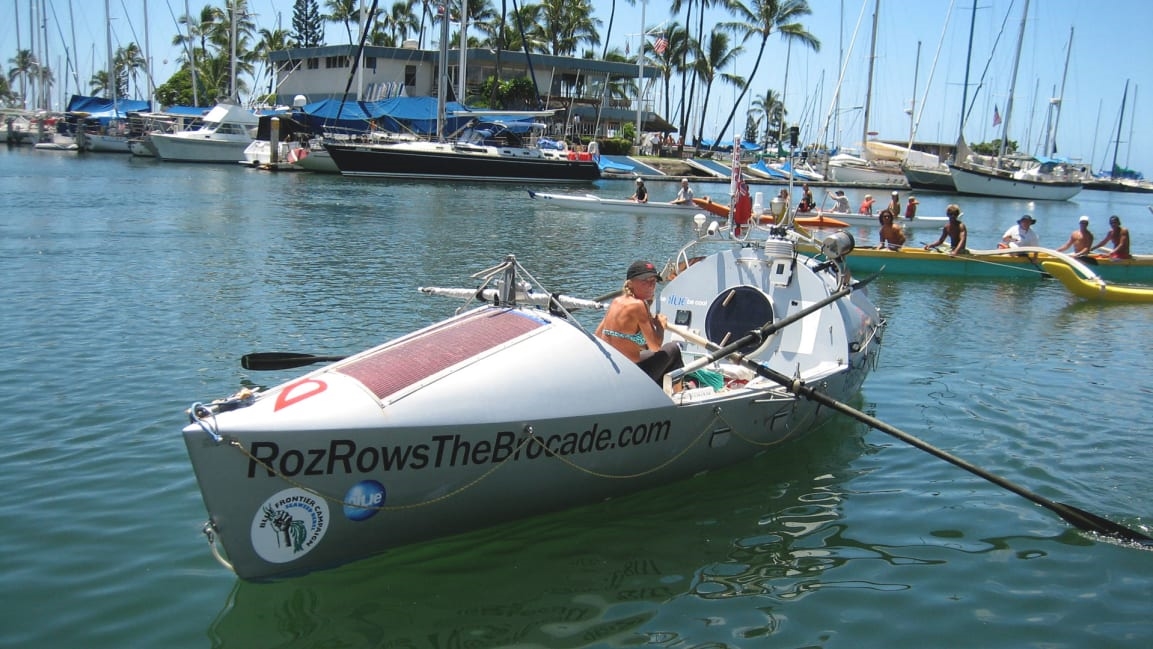What rowing solo across the ocean teaches you about solitude
Roz Savage has rowed solo across three oceans—the Atlantic, the Pacific, and the Indian—in a small boat. She earned four Guinness World Records.
She was alone at sea up to five months at a time, journeys she recounts on her website, and in her new book, The Gifts of Solitude. The insights she provides about solitude are powerful ones, especially for anyone dealing with isolation during the COVID-19 pandemic.
I interviewed Savage recently and drawing upon her experience at sea, she offers seven practical tips for anyone sheltering at home:
1. BREATHE
First, delight in slow, deep breaths.
“I discovered the power of breathing when I was rowing across the Atlantic Ocean,” says Savage. “There were so many life-threatening situations that made me panic. For example, when the boat’s electrical system went down or the winds were blowing fiercely, or when my four—and only—oars broke, I felt panic-stricken. I would take deep breaths, and that would calm me.”
Panic is a natural response to the pandemic. “But by breathing, we can each dissipate that fear,” she says. “We can only take one breath at a time, and that breath is always in the present. So breathing deeply situates us in the moment and prevents us from worrying about the future.”
2. HARNESS YOUR INNER VOICE
Second, take control of your inner voice and make it your ally, not your opponent. “During times of crisis,” Savage explains, “we may find ourselves battling with the voices in our head. When we are alone, we are brought face-to-face with our inner voices, which can be harsh.”
“When I was rowing, I struggled with these voices,” she said, “especially in the Atlantic, my first voyage. Then one day another ocean rower sent me a lovely message: ‘It’s lucky you’re tougher than most.’ His words inspired me, and I actually rowed to those words. With each oar I pulled, I said to myself, ‘Tougher than most.’ It became a soothing mantra.”
That advice is useful for all of us. Whether your mantra is “I’ll get through this,” or “This is an opportunity for me to be courageous,” find an expression that reflects your best sense of self. Get your inner voice on your side.
3. REACH OUT –AND CONNECT
Savage rowed solo across the three oceans, but satellite phone communications kept her in touch with her friends and shore team. She posted daily blogs from her boat to share her adventures with old and new friends.
While we’re unfortunate to live in a world with COVID-19, we’re fortunate to live in a time when we have so many ways to connect with family, friends, and colleagues—from postings on social media to Zoom and FaceTime. None of these portals is the same as in-person contact, but they are a good antidote to being alone. So use them.
Pick up your phone and call those you care about. Call an old friend and say, “I’ve been thinking of you,” or contact family members and tell them you love them. All this goodness is a gift of solitude, so take advantage of it.
4. FOCUS ON WHAT YOU CAN CONTROL
Fourth, focus on what you can control, and try to move beyond the areas you can’t.
Savage told me: “When I was on the boat I tried to control the ocean, but that didn’t work. Some days I could go 36 miles without a single oar stroke. On other days I could row 24 hours straight and not even go 36 miles. I couldn’t control the winds, waves, and currents. But what I could do was show up and row for 12 hours each day. I focused on that.”
Bring order to your life, even though the world remains a distressing place. Set a schedule, as Savage did, and follow it. Make sure it includes things like exercise, reading, eating, family, entertainment, and whatever gives you pleasure and a sense of fulfillment. Commit to something you can control.
5. TALK OUT LOUD, SING, DANCE, BE SILLY
Next, cultivate your sense of humor.
“When I was rowing,” Savage says, “it was hard sometimes to laugh. But one day when I was feeling quite depressed I looked at myself—completely naked, as ocean rowers often are, with only a sun hat and rowing gloves on, singing along with Abba’s “Dancing Queen,” . . . blaring away in the middle of the ocean. I thought, ‘This is so ridiculous.’ I just had to laugh.”
6. EMBRACE NATURE
Sixth, find beauty and comfort in nature. “I found . . . that nature can be harsh, but it also was my entertainment, especially after my stereo broke,” says Savage. “It inspired me, especially looking at the night sky, gazing at all the stars, whose light I realized took thousands of years to get to us. . . . My own personal frustrations seemed very small.”
When you feel overwhelmed, look to nature. Take pleasure in the sight of birds, enjoy a romp with your dog, or the spring flowers. Relish the beauty of your natural surroundings.
7. LEARN WOOLGATHERING
Seventh, practice “woolgathering”—a lovely term that refers to daydreaming. It comes from the practice of gathering the loose tufts of wool on bushes, left by passing sheep.
“In the middle of the ocean, it’s easy to daydream,” Savage says. “There’s not as much sensory input as we have on land, where we’re bombarded with media, conversation, and tight schedules. When there isn’t as much coming into our heads, there’s an opportunity to think freely, to dream.”
When we are alone or sheltering in place we have an opportunity to become childlike and more open to the wonders of life. Enjoy the chance you have to be away from your normal routine. Spend time dreaming.
(48)



